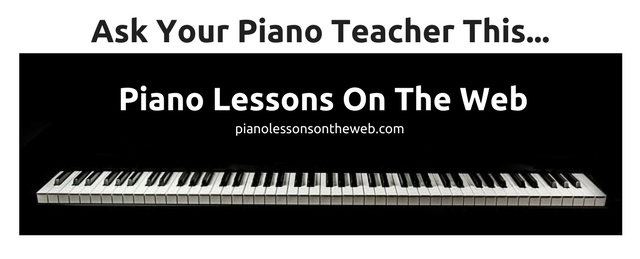|
At one point or another in our piano studies we're going to obtain a private piano teacher to help us learn what we need to know to reach that ultimate goal of being able to play what we want to...on our pianos. Teachers really do help us know how to learn and what to learn. Good teachers, that is. Teachers are different from tutors. Tutors help us with our homework...so to say, or in piano terms they'd help us with our practicing; but teachers teach us how to do something. They equip us with the right tools and teach us how to use them to accomplish our goal. Teachers have professional experience and college degrees that have formalized their expertise. So when we go to a particular teacher, we're learning essentially what they have also learned from their previous teachers. It is one of the beautiful legacies of teaching music...it's always passed down to future students. It sounds a bit like how stories are passed down as well, doesn't it? Fishing stories come to mind as I write this...by the time my Dad's fishing tale would have made the rounds, the fish would have grown about 12 inches from the original size! What we see happen in the sharing of stories, is that they change just every so slightly with each different version, because there is new input from the individual sharing the information. This is similar with teaching the piano. Teachers don't exaggerate the information like we do in story sharing; but we do put our individual input into it which ends up adding a special and unique aspect to the general idea. This is the part that you want to dive into with your teacher and pull out of them...their own experience. The best teacher most times, is experience. You want your teacher to share with you their own struggles and how they overcame them...not just the general concepts. Let's say that you are struggling with keeping your notes together when you try to play with both hands together. Now your teacher will give you exercises, tell you how to practice them, and go over them with you so you'll be able to do them at home. But...I want you to go further than that next time. Ask your teacher this... "What did YOU do to overcome this challenge that worked for you?" As a general rule, all teachers are sharing their own experience through their teaching, but they don't always think that their personal challenges and how they overcame them would necessarily apply to students...so they/we stick with..."this is how you practice this," instead of saying, "OK, I tried that and it didn't work, but this did." What happens when you reach out to this part of your teacher is that an exchange begins that is fresh, impromptu, improvisational, and alive! It's actually like making music together. Students are encouraged from seeing that their teachers struggled with the very same issues that they are and that they can be overcome. And it's good for students to see that teachers make mistakes too. :) Chances are, your teacher is already doing this. Start looking for that personal input from your piano teacher in the dialogue that you share. Whenever you hear your teacher say things like:
If you aren't getting this type of input from your teacher, maybe you're the one to help pull it out of them! Students are the teachers of teachers. Don't hesitate to ask you teacher this question anytime you need help with something or want to learn something new: "What did YOU do to overcome this challenge that worked for you?" That one question will open up a whole new level in the connection you have with your teacher. It's a gift for everyone! Stay Tuned to PianoLessonsOnTheWeb.com to learn much more and achieve your dream of playing the piano!
Shanya Ratnayaka
1/8/2021 09:37:43 am
When writing the B flat melodic minor scale in a different degree, for example submediant, do you raise the 6th and 7th asc. and lower the 6th and 7th desc. of the E flat scale I will be writing or do you have to take into account the usual 6th and 7th notes of the B flat minor scale?
Reply
I truly resonated with the sentiments expressed in this article. It's an evocative reminder of the deeply personal journey that learning the piano is, and how essential the teacher-student dynamic plays into it. The comparison between the evolution of teaching methods and the way stories change over time is particularly poignant. Having recently searched for piano lessons in Fresno, this insight will definitely guide me in understanding and communicating better with my potential instructors. The question, "What did YOU do to overcome this challenge that worked for you?" is indeed powerful. I wonder, do you think this personal approach to teaching also applies to other forms of art or disciplines, or is it uniquely applicable to music?
Reply
Leave a Reply. |
AuthorMost blogs written by Archives
June 2020
Categories
All
|


 RSS Feed
RSS Feed